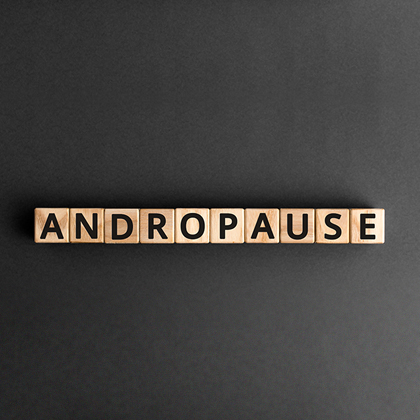
While benign prostatic hyperplasia (BPH) isn’t a life-threatening condition, we recognise it can have a significant impact on mental wellbeing and quality of life. Many studies have shown that BPH can cause feelings of low mood, anxiety, and stress (1). Unfortunately, the associated emotional distress may even exacerbate BPH symptoms, perpetuating a vicious cycle and compounding the issue.
In this guide, we explore the link between BPH and stress, offering practical strategies for coping with both the physical and emotional aspects of the condition.
What is BPH?
The prostate is a walnut-shaped gland located just below your bladder. As you age, the prostate can naturally enlarge in size. In many cases, it can grow so much that it causes benign prostatic hyperplasia (BPH), also known as an enlarged prostate. In BPH, the prostate presses against the urethra and causes urinary issues.
The signs of BPH include:
-
A weak or slow urine flow that starts and stops
-
Dribbling at the end of urination
-
A sudden urge to pass urine
-
Passing more urine during the day
-
Inability to fully empty the bladder
-
Frequent urination at night (nocturia)
It’s important to note that BPH is more than its physical symptoms. The urinary complaints associated with an enlarged prostate have broader implications for daily life and emotional wellbeing.
Simple tasks, like venturing out of the house or commuting to work, can become fraught with anxiety if you’re constantly worried about accessing toilet facilities.
The exhaustion from frequent night-time bathroom visits can also leave you drained and emotionally reactive. And the cumulative lack of sleep can quickly take its toll on your mood and wellbeing.
On top of these challenges, you may feel too embarrassed to open up to loved ones and romantic partners for fear of being ‘emasculated’.
Overall, BPH can make you feel isolated, frustrated, and anxious. If you’re finding things hard, please know you’re not alone.
How does stress affect BPH?
Stress seems to have a hand in many health conditions. And although it doesn’t directly cause BPH, it can make symptoms worse.
Stress release adrenaline
Stress triggers a ‘fight-or-flight’ response, releasing hormones like adrenaline into the body. Adrenaline can make the prostate and bladder muscles contract (2). In the context of BPH, this could make it more uncomfortable to empty your bladder completely.
Stress can increase pelvic floor tension
When you’re stressed, your pelvic floor muscles can also tighten and tense, which can make the urethra narrower (3). As a result, you may find it harder to pass urine, compounding BPH symptoms.
Stress exhausts zinc stores
Studies suggest stress can also deplete mineral levels like zinc in the body (4). Zinc is critical for normal testosterone, fertility, reproduction, and the protection of cells from oxidative damage, making it essential for men’s health.
Stress often kickstarts a vicious cycle
It’s also worth mentioning stress and BPH can have a complex and multi-layered relationship. The more exacerbated your BPH symptoms, the more stressed you feel. Similarly, the more exasperated you become, the more aggravated your BPH symptoms. Understandably, this cycle can leave you feeling isolated and frustrated.
Stress management techniques
While you can’t avoid stress entirely, you can certainly learn to manage it. With healthy coping mechanisms in place, you can avoid making an already stressful prostate condition even more challenging.
Breathe from your diaphragm
When you’re stressed, your breathing can become shallow, erratic, and chest-heavy, which keeps your body stuck in an anxious state. Consciously engaging with your breath can quickly downregulate the stress response and encourage full-body relaxation.
Deep belly breathing – breathing from your belly (diaphragm) through your nose – activates the parasympathetic nervous system, responsible for the ‘rest and digest’ state, and communicates to your body that you’re safe.
Take a moment to connect with your breath when you wake up, just before a demanding work meeting, or whenever you feel stressed. Start with this simple exercise known as ‘box breathing’.
Breathe in for four (pushing your belly out), hold for four, breathe out for four (pulling your belly in), then hold for four. Repeat this exercise for as long as you need to feel balanced and grounded.
Move more
Exercise stands as one of the best tools to support mental health and reduce stress. Movement triggers the release of feel-good endorphins, naturally lifting mood. Engaging in exercise can also serve as a distraction, diverting you from negative thoughts and endless rumination.
In addition to its mental health benefits, exercise also supports the management of enlarged prostate symptoms. You can find out more about the relationship between physical activity and prostate health here.
Just 30 minutes of moderate activity five times a week is enough to improve your mood and manage stress. If 30 minutes feels like a stretch, break it down into 15-minute or 10-minute movement snacks.
Remember, choosing a form of exercise you enjoy is crucial. Movement should be enjoyment, not seen as a chore! Mind-body activities like yoga, Pilates, and qi gong are particularly excellent choices for promoting relaxation and calming the body.
Prioritise sleep
Far from being a mere ‘luxury’, sleep is essential for good mental and emotional health. During REM sleep, the principal stage where dreaming occurs, the brain processes emotions and memories, softening any sharp edges and making them less distressing (5). Sleep expert Matthew Walker even refers to sleep as ‘overnight therapy’ (6).
Frustratingly, poor sleep and stress often exist in a negative feedback loop: stress can disrupt sleep, and a lack of sleep can worsen stress. In the context of BPH, nocturia (frequent urination at night) can aggravate both emotional reactivity and sleeplessness.
Thankfully, with good sleep hygiene practices in place, you can help break this cycle.
Tips for better sleep with BPH
-
Reduce fluid intake in the evening, especially before bed
-
Refrain from drinking caffeine after midday
-
Avoid drinking alcohol in the evening
-
Try to wake up and go to bed at the same time each day
-
Ensure your bedroom is dark, temperate, and quiet
-
Try to get lots of natural morning light to regulate your circadian rhythm
-
Implement a strict curfew on all technology 90 minutes before bed
-
Remove all clock faces from your bedroom
You can learn more about navigating nocturia and sleep here.
Get help
Seeking support from your loved ones or opening up to mental health professionals can be incredibly valuable as you navigate the intricacies of BPH and stress.
However, we acknowledge that having candid discussions about your prostate health and emotional wellbeing isn’t always easy. Many men feel embarrassed or ashamed, while others worry that discussions about prostate health may diminish their masculinity.
It’s worth reaffirming that speaking honestly about BPH and stress won’t ever result in a loss of ‘manhood’. In fact, taking action in the name of your health highlights your strength, responsibility, and conscientiousness.
If you’re struggling to discuss the subject of BPH with your romantic partner, you’re not alone. Given the stigma surrounding this topic, it’s perfectly understandable to find it challenging. As a first step, consider contacting your GP, a therapist, a men’s group, or even our team of Nutrition Advisors, who are on hand to provide free, expert advice.
It takes huge amounts of courage to open up about personal health issues, but we want to reassure you that it’s a tremendously positive step.
Natural remedies for stress
Of course, your diet can also complement stress management. Incorporating the following nutrients into your diet can further support your emotional health and mood.
Magnesium
An essential mineral involved in over 300 biochemical processes, magnesium contributes to normal psychological and nervous system function, making it essential for mental health. Find it: Leafy green vegetables, such as spinach and kale.
B vitamins
The B vitamins are essential for your emotional wellbeing. Stress and certain medications can often lead to poor B vitamin absorption, so it’s worth paying extra attention to your intake.
-
Vitamin B5 supports normal mental performance. Find it: Mushrooms.
-
Vitamin B6 contributes to normal psychological function. Find it: Bananas.
-
Biotin contributes to normal psychological function. Find it: Seeds.
-
Vitamin B12 contributes to normal psychological function. Find it: Nutritional yeast or supplements.
You can find excellent levels of vitamins B1, B6 (as PSP), and B12 to support the nervous system in our comprehensive formula NEURO-B.
Omega 3
The long-chain omega 3 fatty acid, DHA (docosahexaenoic acid), is essential for overall health, particularly when it comes to maintaining normal brain function (based on a daily intake of 250mg). Find it: Salmon or plant-based microalgae in supplement form.
Adaptogens
Adaptogens like Ashwagandha are widely used to bring the body back to a state of balance.
L-theanine
An amino acid found in green and black tea, L-theanine, is known for its calming and soothing properties. It’s a great choice for people with busy lifestyles.
5-HTP
5 hydroxytryptophan, or 5-HTP, is a natural compound derived from the amino acid tryptophan. The brain converts 5-HTP into serotonin, the ‘feel-good’ neurotransmitter that plays a crucial role in mood regulation.
PEA
PEA (Palmitoylethanolamide) is a well-researched alternative to CBD and is often recommended to support mood and overall wellbeing.
Other lifestyle changes to support BPH
Besides implementing strategies to manage stress, making the following changes to your lifestyle can support the reduction of BPH and its associated symptoms.
-
Adopt a Mediterranead diet: Studies suggest men who eat more fruit and vegetables are less likely to develop prostate problems (7).
-
Include certain nutrients, such as zinc, vitamin D3, beta-sitosterol and quercetin. You can explore our expert nutritional formulas for mature men here.
-
Go easy on red meat, dairy, and caffeine. These culprits commonly exacerbate BPH symptoms and urinary issues.
-
Reduce alcohol. Alcohol is diuretic, meaning it increases urine production.
-
Avoid smoking. Quitting smoking is critical for those with BPH.
Read more about lifestyle changes to support benign prostatic hyperplasia here.
Want to find out more?
Living with BPH can be stressful and make even the simplest tasks challenging. If you feel caught in a cycle of endless anxiety and BPH symptoms, remember that you’re not alone. In the face of BPH stress and the normal demands of modern life, it’s essential to have tools in your arsenal to support your overall wellbeing.
As always, don’t hesitate to contact our team of expert Nutrition Advisors, who are always available to provide free, confidential advice via email, phone, and Live Chat* should you need it. You can also read more about supporting your prostate health on Nutrition Buzz.
A final note from our Nutrition Advisors: If you experience any signs of urinary discomfort, such as nocturia (frequent urination at night), a sensation of incomplete bladder emptying, or a weakened or interrupted urine stream, it’s important to consult your doctor for medical advice. They can help determine if you have benign prostatic hyperplasia or another prostate condition that may need prompt medical intervention.
*Subject to cookie consent
References:
-
Koh JS, Ko HJ, Wang SM, Cho KJ, Kim JC, Lee SJ, Pae CU., The Relationship between Depression, Anxiety, Somatization, Personality and Symptoms of Lower Urinary Tract Symptoms Suggestive of Benign Prostatic Hyperplasia. Psychiatry Investig. 2015;12(2):268-73.
-
Knowledge, H.P.. Stress and benign prostatic hyperplasia (BPH). [online] Harvard Health. Available at: https://www.health.harvard.edu/blog/stress-and-benign-prostatic-hyperplasia-bph-20090929192
-
Thüroff JW, Casper F, Heidler H., Pelvic floor stress response: reflex contraction with pressure transmission to the urethra. Investigative Urology 2 1987. (pp. 124-130). Springer, Berlin, Heidelberg. Available from: https://link.springer.com/chapter/10.1007/978-3-642-72735-1_19
-
Lopresti AL., The Effects of Psychological and Environmental Stress on Micronutrient Concentrations in the Body: A Review of the Evidence. Adv Nutr. 2020;11(1):103-112.
-
Vandekerckhove M, Wang YL., Emotion, emotion regulation and sleep: An intimate relationship. AIMS Neurosci. 2017;5(1):1-17.
-
Walker MP, van der Helm E., Overnight therapy? The role of sleep in emotional brain processing. Psychol Bull. 2009;135(5):731-48.
-
Russo GI, Broggi G, Cocci A, Capogrosso P, Falcone M, Sokolakis I, Gül M, Caltabiano R, Di Mauro M., Relationship between Dietary Patterns with Benign Prostatic Hyperplasia and Erectile Dysfunction: A Collaborative Review. Nutrients. 2021;13(11):4148.
You Might Also Like
Disclaimer: The information presented by Nature's Best is for informational purposes only. It is based on scientific studies (human, animal, or in vitro), clinical experience, or traditional usage as cited in each article. The results reported may not necessarily occur in all individuals. Self-treatment is not recommended for life-threatening conditions that require medical treatment under a doctor's care. For many of the conditions discussed, treatment with prescription or over the counter medication is also available. Consult your doctor, practitioner, and/or pharmacist for any health problem and before using any supplements or before making any changes in prescribed medications.

Olivia
Olivia Salter has always been an avid health nut. After graduating from the University of Bristol, she began working for a nutritional consultancy where she discovered her passion for all things wellness-related. There, she executed much of the company’s content marketing strategy and found her niche in health writing, publishing articles in Women’s Health, Mind Body Green, Thrive and Psychologies.
View More



